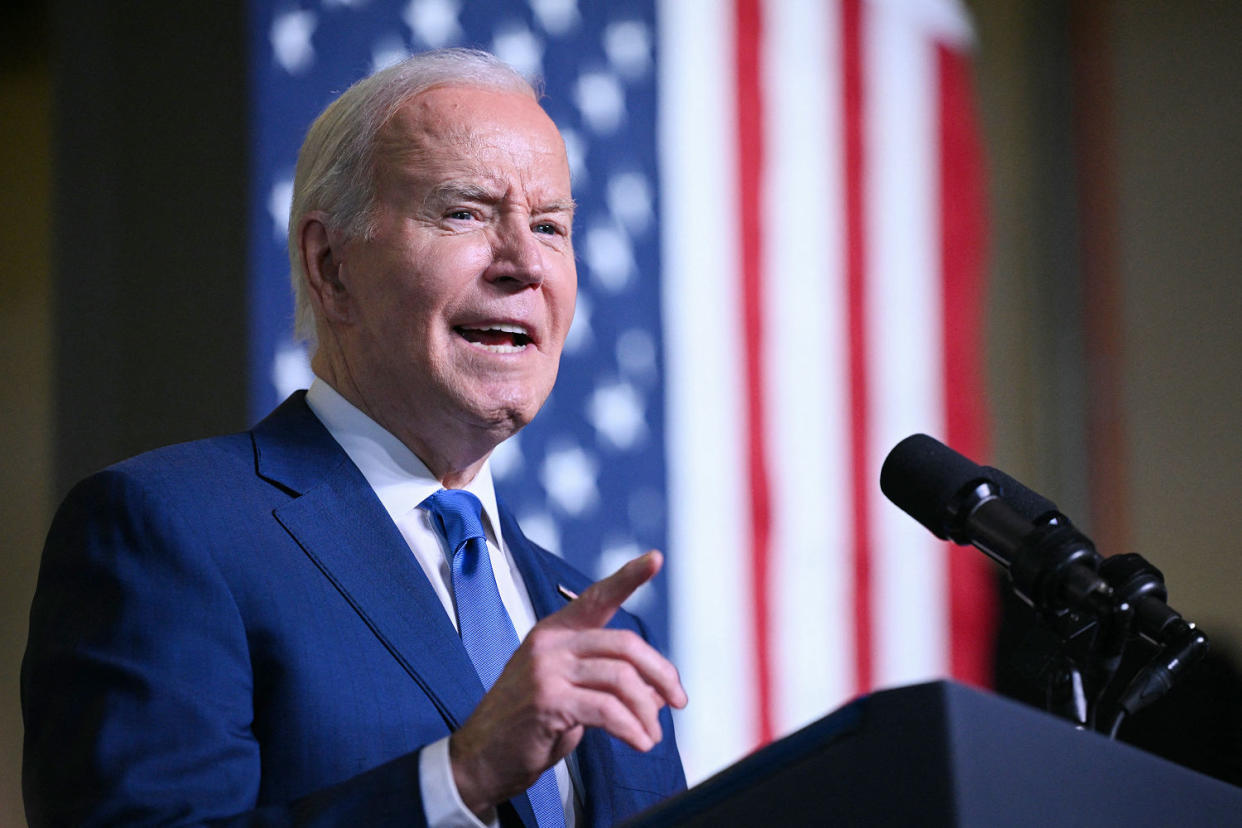Opinion | Biden is swinging right to beat Trump. That's a mistake.

- Oops!Something went wrong.Please try again later.
- Oops!Something went wrong.Please try again later.
President Joe Biden is struggling to make headway in his re-election campaign, with recent polling still showing him in a neck-and-neck race with former President Donald Trump. Incumbent presidents often have a structural advantage in these kinds of campaigns, especially when it comes to making policy that might help them win over uncertain voters in the fall. It’s a lever that Biden isn’t afraid to pull, but a series of moves he has telegraphed to try to ward off Republican attacks is poised to do more harm than good.
In a strategy Axios describes as “trying to trump Trump” on issues with which the former president has an advantage with voters, the Biden administration is reportedly poised not just to keep many of the tariffs that Trump raised on Chinese goods, but also to add on new ones targeting electric vehicles and solar panels. Biden is also reportedly considering issuing new restrictions on immigration at the southern border, limiting the number of people who can claim asylum once they’ve crossed into the U.S.
It sounds like the latest version of triangulation, employed by Democrats who are worried about coming across like Democrats in a close election. Triangulation, the co-opting of conservative talking points to throw off GOP attacks, is a form of political judo. President Bill Clinton used it to greatest effect in his 1996 re-election campaign, pivoting hard after Republicans reclaimed control of the House for the first time in 40 years to push welfare reform, deficit reduction and deregulation but in a way that he claimed would be less harmful than what Republicans with their “Contract With America” would do.
“The country likes the general direction of the Republicans,” GOP media consultant Robert Goodman told The Washington Post in 1995, “but they just think it’s too fast and too harsh. Clinton, in image terms, is portraying himself as the person who really accepts the direction, but just wants to make it a more pleasant journey and stop people from getting hurt unnecessarily.” In his case, it worked. A country that had been primed to see big government as a bad idea rewarded him for his centrism. But things have changed in 28 years in the face of increased polarization and a growing disillusionment with the status quo.
For one, if this is a case of the White House following the polls, as Clinton notoriously did, I fear it’s reading the wrong analyses. For example, given Trump’s lead among those who list immigration as their top concern, it’s understandable that Biden would want to neutralize it as a weapon in the election. But my colleague Zeeshan Aleem has argued that the supposed national concern with immigration as an issue is driven more by Republican voters’ parroting Trump and conservative media than by a true top-level concern of anyone Biden could win. And there’s still a lot of misinformation about the effects of undocumented immigration among voters, who believe that “illegal immigration” increases crime rates, among other falsehoods that are sure to boost those numbers further.
Meanwhile, there are warning signs in the latest New York Times poll of five battleground states that should be drawing more concern from Biden’s campaign:
It’s hard to see, then, how the actions that Axios highlighted would help him with those voters who are looking for more than normalcy. (I must take a moment to lament the death of Biden’s transformative Build Back Better plan at the hands of the GOP and Sen. Joe Manchin, D-W.Va.) In an election that is likely to again be won at the margins, it is paramount that Biden shore up his own base of support. The idea of trying to win over persuadable voters is sensible, noble even. But the solution to disillusionment can’t be to further alienate his core audience, who, thanks in part to issues that include the war in Gaza, are showing cracks in their support.
Moreover, the choices being made aren’t abstractions. Like the “compromise” we saw from the White House on trans rights last year, when Biden tried to find a middle ground between transphobia and simply letting students play sports, the decisions Biden is preparing to make will hurt real people. Limiting asylum claims at the border means turning away people who are fleeing violence and oppression for, at best, marginal political gain. Likewise, turning to protectionism against Chinese products both raises prices for American consumers and turns what should be a major, potentially civilization-saving shift from fossil fuels into yet another bout of nationalist competition.
And finally, it’s worth noting (yet again) that this is being done with no hope of reciprocity from conservatives, who almost never attempt to court the left’s votes or try to appeal to left-of-center moderates with their policies.
The math of how to put together a winning coalition in a presidential race is somewhere between basic arithmetic and some kind of arcane calculus. There’s always a certain amount of give and take as campaigns decide which issues to highlight and as incumbents develop policies that could win or lose them second terms. But Biden is falling into the same trap that Democrats can’t seem to avoid, in which apologetic moves to the right are deemed necessary to steal votes from the GOP’s camp and the betrayal of one’s own voters is presumed to have little effect. In this case, it’s a strategy that is more likely to cost Biden votes from Democrats than win him votes from those leaning toward Trump.
This article was originally published on MSNBC.com

